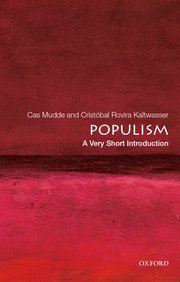 Your perception is accurate….. The world is becoming more populist, according to a new research project by the Guardian and Team Populism. Professor Kirk Hawkins, from Brigham Young University in Utah, and 46 researchers analysed 728 public addresses by 140 presidents and prime ministers in 40 countries, in Europe and the Americas, writes populism expert Cas Mudde:
Your perception is accurate….. The world is becoming more populist, according to a new research project by the Guardian and Team Populism. Professor Kirk Hawkins, from Brigham Young University in Utah, and 46 researchers analysed 728 public addresses by 140 presidents and prime ministers in 40 countries, in Europe and the Americas, writes populism expert Cas Mudde:
The study shows not just that the number of populist leaders has doubled, but that the average populist content of political leaders’ speeches has doubled too. Where political speeches were on average “not populist” in 2004, they are approaching “somewhat populist” today. To be clear, most of the political leaders studied were “not populist”, but that is to be expected of this particular subset of politicians, i.e., national leaders.
“The only way to change the populist zeitgeist is to denounce both populism (lite) and anti-populism – in which ‘the people’ are seen as corrupt and the (former) elite as morally pure,” Mudde contends. “[W]e have to (re)politicise the political debate, but by openly acknowledging and respecting the pluralism of our societies – in terms of interests and opinions, rather than ethnicities or religions.”
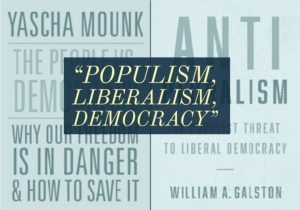 Populist leaders are associated with significant reductions in economic inequality across the world, but often at a cost to democratic liberties, according to groundbreaking research that will challenge the assumption that populism only has negative consequences, the Guardian adds. However, the research by political scientists and economists also found that governments run by populist leaders are correlated with declines in the quality of elections, a loosening of constraints on executive power, and a sometimes dramatic fall in press freedom.
Populist leaders are associated with significant reductions in economic inequality across the world, but often at a cost to democratic liberties, according to groundbreaking research that will challenge the assumption that populism only has negative consequences, the Guardian adds. However, the research by political scientists and economists also found that governments run by populist leaders are correlated with declines in the quality of elections, a loosening of constraints on executive power, and a sometimes dramatic fall in press freedom.
A recent Brookings paper from Katy Collin – Populist and authoritarian referendums:
The role of direct democracy in democratic deconsolidation – examines whether populists and authoritarians are using referendums to try to extend their power and rid themselves of liberal constraints. It finds that it is doubtful that referendums play a key role in democratic decline, but that variation is considerable across regions. RTWT
Learning from populism?
“Without citizens’ participation, Europe is in trouble. Democracy means citizens engagement in politics,” said Yves Sintomer, a French sociologist from the Centre Marc Bloch, Euronews reports:
In an era of political disengagement and refusal of institutions, citizens are discovering a new dimension of activism and shared responsibility in society. Is Europe ready to listen to public views? According to Sintomer it would be the only way for Europe to face its critical challenges. Political participation from the bottom up is essential to rebuild a sentiment toward European citizenship.
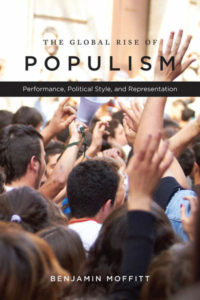 “The mainstream anti-populism campaign is a failure. Populism does not only have a negative meaning, it also comes from the voices of people which Europe should take into account. Populism becomes a danger when citizens do not feel heard and that grows into anger,” Sintomer told the Italian Institute of Culture in Brussels.
“The mainstream anti-populism campaign is a failure. Populism does not only have a negative meaning, it also comes from the voices of people which Europe should take into account. Populism becomes a danger when citizens do not feel heard and that grows into anger,” Sintomer told the Italian Institute of Culture in Brussels.
To the extent that it can be defined as a political tendency that demonizes any and all opposition to it as inherently illegitimate, populism is indeed a menace to liberal democracy, a constitutive element of which is pluralism—the belief that for a society to be decent it must make room for various perspectives, attitudes, and political formations, notes James Kirchick, a visiting fellow at the Center on the United States and Europe and Project on International Order and Strategy at the Brookings Institution and author of The End of Europe: Dictators, Demagogues, and the Coming Dark Age (Yale University Press, 2017).
But what if the phenomenon that is near-universally described as “populism” is not so much hostility to liberal democracy per se, but an expression of frustration that liberal democracy has not been democratic enough? Kirchick asks in the American Interest:
What if populism is mainly being driven not by some desire to undo liberal democracy and replace it with autocracy, but by frustration with Western political establishments for not heeding the popular will on an issue of major importance to voters—that is, mass immigration? The rise of populist politics in the West is often laid at the feet of the 2008 financial crisis, and a range of economic factors—from the growing gap between rich and poor to declining wage growth—have all surely played a part in fanning the flames of populism on both the Left and Right. But in countries as diverse as Germany, Poland, and Sweden, the rise of populist political tendencies cannot be blamed on the usual suspect of poor economic performance; all three countries have posted impressive growth and low unemployment since the 2008 financial crisis.
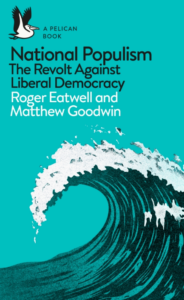 “The majority of academic studies over the past three decades have found that objective economic indicators such as income have only a weak effect or none at all when it comes to explaining the appeal of national populism,” observes Matthew Goodwin, an expert on European populism (right) and a professor at the University of Kent.
“The majority of academic studies over the past three decades have found that objective economic indicators such as income have only a weak effect or none at all when it comes to explaining the appeal of national populism,” observes Matthew Goodwin, an expert on European populism (right) and a professor at the University of Kent.
To save liberal democracy from its illiberal antagonists, [there is a] need to decouple the highly charged subject of immigration from those metrics—respect for checks and balances, adherence to the rule of law, protection of minorities, pluralism, freedom of the press, support for democratic alliances, a values-based foreign policy, and so on—that truly determine whether a nation is a liberal democracy and a contributor to the liberal world order, adds Kirchick, a former Penn Kemble Fellow at the National Endowment for Democracy:
Japan is one example of a nation that has a highly restrictive (one might even say xenophobic) immigration policy but is nonetheless a liberal democracy and plays a productive role in maintaining liberal order. It is my contention that, if leaders who are genuinely committed to preserving this order ignore or dismiss popular opinion on immigration, they will lose ground to far Right movements committed to neither. RTWT
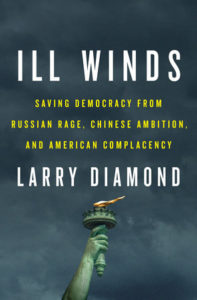 “It’s not just that liberal democracy is retreating under pressure from demagogic politicians exploiting the stresses of globalization, rising inequality, economic insecurity, job displacement, immigration, and so on,” argues Larry Diamond, author of a prescient new book, “Ill Winds: Saving Democracy From Russian Rage, Chinese Ambition, and American Complacency.” “It’s that authoritarian forces everywhere perceive that there is no longer any price to pay for ruling as nastily as they want.”
“It’s not just that liberal democracy is retreating under pressure from demagogic politicians exploiting the stresses of globalization, rising inequality, economic insecurity, job displacement, immigration, and so on,” argues Larry Diamond, author of a prescient new book, “Ill Winds: Saving Democracy From Russian Rage, Chinese Ambition, and American Complacency.” “It’s that authoritarian forces everywhere perceive that there is no longer any price to pay for ruling as nastily as they want.”
So, today, “every type of regime is getting worse,” Diamond adds. “Liberal democracies are becoming more intolerant. Illiberal democracies are electing authoritarian personalities like President Duterte in the Philippines, who are purging judges and locking up journalists who dare to criticize them. Authoritarian regimes that once coexisted with pockets of opposition no longer see the need to bother. In Cambodia, the party of the long-ruling dictator, Hun Sen, now controls every seat in Parliament. And China is now constructing the first truly Orwellian surveillance state.”







